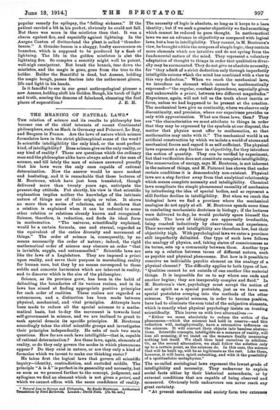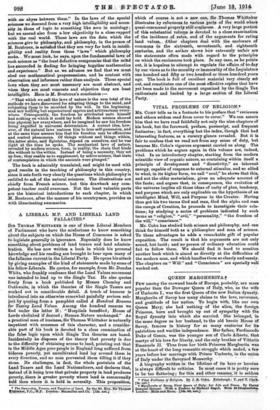THE MEANING OF NATURAL LAWS.*
THI4 relation of science and its results to philosophy has become one of the chief interests of recent Continental philosophers, such as Mach in Germany and Poineare, Le Roy, and Bergson in France. Are the laws of nature which science formulates laws in the strict philosophical sense of the word ? Is scientific intelligibility the only kind, or the most perfect kind, of intelligibility P Does science give us the only reality, or any kind of reality ? These are questions which the ordinary man and the philosopher alike have always asked of the man of science, and till lately the man of science answered proudly that his laws were the only ones capable of rational determination. Now the answer would be more modest and hesitating, and it is remarkable that these lectures of M. Boutroux, which have just been translated, though delivered more than twenty years ago, anticipate the present-day attitude. Put shortly, his view is that scientific explanation implies neither the knowledge of the intrinsic nature of things nor of their origin or value. It shows no more than a aeries of relations, and it declares that a relation is explained when it can be reduced to some other relation or relations already known and recognized. Science, therefore, is reduction, and finds its ideal form
in mathematics. "The universe, scientifically explained, would be a certain formula, one and eternal, regarded as the equivalent of the entire diversity and movement of things." The order of science is, consequently, by no means necessarily the order of nature ; indeed, the rigid mathematical order of science may obscure an order "that is invisible, supple, and untrammelled." Scientific laws are like the laws of a Legislature. They are imposed a priori upon reality, and serve their purpose in marshalling reality for human uses, but they by no means correspond to those subtle and concrete harmonies which are inherent in reality, and to discover which is the aim of the philosopher.
Science, as its province grew, has been in the habit of delimiting the boundaries of its various realms, and in its laws has aimed at finding appropriate positive principles for each order of realities. These realms are regarded as autonomous, and a distinction ha a been made between physical, mechanical, and vital principles. Attempts have been made to reduce all the special sciences to a mathe- matical basis, but to-day the movement is towards local self-government in science, and we are inclined to grant to each special domain its specific principles. M. Boutroux accordingly takes the chief scientific groups and investigates their principles independently. He asks of each two main questions. How far are such laws intelligible—that is, capable of rational determination ? Are these laws, again, elements of reality, or do they only govern the modes in which phenomena appear ? Do they exist in nature, or are they only a kind of formulae which we invent to make our thinking easier ?
He takes first the logical laws that govern all scientific inquiry—identity, contradiction, and excluded middle. The principle "A is A" is perfect in its generality and necessity, but as soon as we proceed further to the concept, judgment, and syllogism we find an element which is not given a priori, and which we cannot affirm with the same confidence of reality.
• Natural Late in &isnot and Philosophy. By Emile Boutronz. Authorized Translation by Fred Bothwell, London; David Butt. Va. 65. net..„1
The necessity of logic is absolute, so long as it keeps to a bare identity ; but if we seek a greater objectivity we find something which cannot be reduced to pure thought. In mathematical laws we see an advance in objectivity as compared with logical laws, but a loss in intelligibility. They cannot, in M. Boutroux's view, be brought m ith in the compass of simple logic; they contain more elements which are intuitive and do not spring from the fundamental nature of the mind. They represent a voluntary adaptation of thought to things in order that qualitative diver- arty may be surmounted. They do not give us absolute necessity, for "they admit of a strict deduction only through imperfectly intelligible axioms which the mind has combined with a view to this very deduction." When we reach the mechanical laws, we introduce an element which cannot be mathematically expressed—" the regular, constant dependence, especially given and unknowable a priori, between two different magnitudes." Experience, again, will not tell us the truth about inertia or force, unless we had happened to be present at the creation. The mechanical laws give us continuity, where we observe only discontinuity, and precision, where our experience provides us only with approximation. What are these laws, then ? They are "the characteristics we must attribute to things in order that they may be expressed by the symbols at our disposal, the matter that physics most offer to mathematics, so that mathematics may unite with it." The mechanical world is an artificial construction by which we isolate a world of atoms and mechanical forces and regard it as self-sufficient. The physical laws represent a step further in objectivity, for they introduce the notion of quantity. They can be verified by experiment, but that verification does not constitute complete intelligibility. The conservation of energy, says M. Boutroux, is not inherent in the nature of things, and M. Poincare has shown that under certain conditions it is demonstrably non-existent. Physical laws are a step further away from that analytical relationship which means complete necessity and intelligibility. Chemical laws complicate the simple phenomenal causality of mechanics by introducing the idea of special bodies, and so represent a still further decline in intelligibility. But when we reach the biological laws we find a province where the mechanical analogies do not apply at all. M. Boutroux spends some time in combating mechanistic doctrines in biology; if the lectures were delivered to-day, he would probably spare himself the trouble. The laws of biology are apparently irreducible, being reached inductively by observation and experience. Their necessity and intelligibility are therefore low, but their objectivity high. With psychological laws we enter a province still imperfectly delimited. One type of such laws follows the analogy of physics, and, taking states of consciousness as its terms, sets up a community between them. Another type sets up a relation between terms of different nature, such as psychic and physical phenomena. But how is it possible to conceive an indivisible psychic element on the analogy of a physical element ? The difficulty applies to both types of law. "Qualities cannot be set outside of one another like material things. It is impossible for us to say where one ends and another begins ; they are insuperably complex and fluid." In M. Boutroux's view, psychology must accept the notion of soul or spirit as a special postulate, just as we have seen special postulates creeping into the methods of the other sciences. The special sciences, in order to become positive, have bad to eliminate the sum total of the subjective elements, which is exactly what physical psychology insists on treating scientifically. This leaves us with two alternatives Either we mean absolutely to reduee the within of the phenomena—which the sciences had held in reserve—and this reduction will, metaphysically, have a retroactive influence on the sciences. It will convert their objects into baseless abstrac, tions. Scientific concepts, intelligible as a measure of reality, will lose all meaning, if we insist on the measure finally measuring nothing but itself. We shall thus land ourselves in nihilism. Or, as the second alternative, we shall follow the solution only up to a certain point, as the sciences do. In this case, the science that will be built up, will be as legitimate as the rest. Like these, however, it will leave spirit subsisting, and with it the possibility of a spiritualistic metaphysics."
The so-called sociological laws represent the lowest grade of intelligibility and necessity. They endeavour to explain social facts either by their historical antecedents, or by external conditions that are capable of being observed and measured. Obviously both endeavours can never reach any great certainty.
At present mathematics and society form two extremes svith an abysm between them." In the laws of the special steienees we descend from a very high intelligibility and feces- aity in those of logic to something like zero in sociology ; List we ascend also from a low objectivity to a close rapport with the real world. Those laws are the data which the sciences give to philosophy, and philosophy, in the person of K. Heutroux, is satisfied that they are very far both in intelli- gibility and reality from those " laws " which philosophy Reeks. We inust look, he says, upon the fundamental law e of each soience as "the least defective compromise that the mind has aneceeded in finding for bringing together mathematics and experience." But as we advance we find that we must shed our mathematical prepossessions, and be content with observation and inference rather than analysis. These special laws when they are most necessary are most abstract, and when they are moat concrete and objective they are least intelligible. Here is M. Boutroux's conclusion :— " That which we call the laws of nature is the sum total of the methods we have discovered for adapting things to the mind, and subjecting them to be moulded by the will. In the beginning, man saw nettling but supernatural caprice and arbitrariness every- where. Consequently, the freedom he attributed unto himself had nothing on which it could lay hold. Modern science showed him physical law everywhere, and he imagined he saw his freedom being engulfed in universal determinism. A correct idea, how- ever, of the natural laws restores him to true self-possession, and at the same time assures him that his freedom may be efficacious and control phenomena. Of things without and things within, the latter alone, said Epictetus, depend on ourselves, and he was right at the time he spoke. The mechanical laws of nature, revealed by modern science, form, in reality, the chain that binds the without to the within. Instead of being a necessity, they set us free; they enable us to supplement, by active science, that state of contemplation in which the ancients were plunged."
The book is admirably translated, and might be used with good results in the teaching of philosophy in this country, since it sets forth very clearly the questions which philosophy is entitled to ask of the natural sciences. The illustrations are chiefly from French science, but this drawback any com- petent teacher could overcome. Not the least valuable parts are the historical introductions to each chapter, in which K. Eoutroux, after the manner of his countrymen, provides us with illuminating summaries.











































 Previous page
Previous page